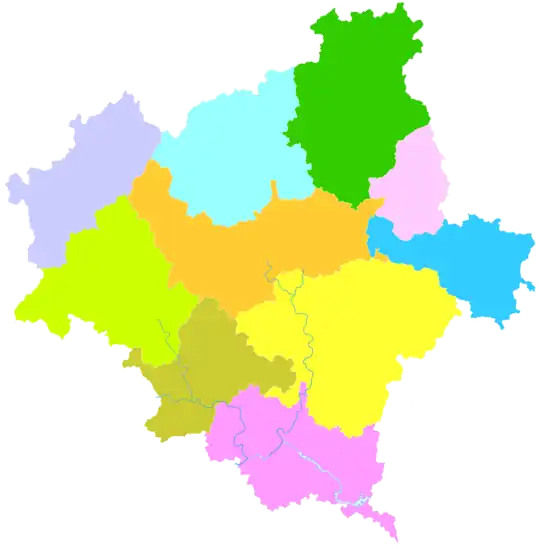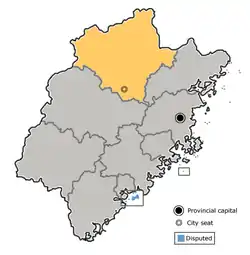Yanping District
Yanping District is a district of Nanping, Fujian province, People's Republic of China. The population of Yanping District was 504,483 at 2016.[1]
Yanping
延平区 Yenping | |
|---|---|
 Skyline of Nanping (at night) | |
| Nickname: Little Hongkong | |
 Yanping in Nanping | |
 Nanping in Fujian | |
| Coordinates (Nanping municipal government): 26°38′31″N 118°10′41″E | |
| Country | People's Republic of China |
| Province | Fujian |
| Prefecture-level city | Nanping |
| Government | |
| • CPC District Committee Secretary | He Mingxing |
| Area | |
| • Total | 2,660 km2 (1,030 sq mi) |
| Population | |
| • Total | 490,000 |
| • Density | 180/km2 (480/sq mi) |
| Time zone | UTC+8 (China Standard) |
| Area code | 0086-599 |
| Vehicle registration | 闽H |
| Website | www |
| Yanping District | |||||||
|---|---|---|---|---|---|---|---|
| Simplified Chinese | 延平区 | ||||||
| Traditional Chinese | 延平區 | ||||||
| |||||||
| Alternative Chinese name | |||||||
| Chinese | 延城 | ||||||
| |||||||
| Second alternative Chinese name | |||||||
| Chinese | 延州 | ||||||
| |||||||
Etymology
The name of the district literally means "Prolong Peace", and it is still commonly referred to as Nanping, which was its name before 1995. Nowadays, people still use both "Yanping" and "Nanping" in mailing address, and Nanping is even more common.
History
.jpg.webp)
The city was built as a house at 196 BC. Before that it was a village governed by Houguan County (Fuzhou). Because it is the start point of Min River, it acts as a trading transferring center between North Fujian, Jiangxi and Fuzhou.
Also, it is the last stronghold of Fuzhou, the largest city in Fujian, and usually carefully guarded. Because the soldiers came from north China, the city's dialect was more similar to that of Henan Province.
Yanping District was named Nanping City at 1956, and after the prefecture-level city was named Nanping in 1995, it changed to its current name.
Geography
Waters
- Min River
- Jianxi Brook
- Futun Brook
- Shaxi Brook
Mountains
- Jiufeng Mountain (literally 9-peak mountain)
- Yuping Mountain
Culture
- Snake Festival: it is held in Zhanghu Town on every seventh day of the seventh month on the Chinese calendar.[2]
- Intangible Cultural Heritage: Zhansheng Drum (Chinese: 战胜鼓; lit. 'Victorious Drum'), Nanjian Opera (南剑戏/乱弹): originated from Xiayang Town, Lingbingyang She song (岭炳洋畲歌)[2]
Industry
- Fujian Nanping Nanfu Battery Co., Ltd.
- Fujian Nanping Aluminium Co., Ltd.
- Fujian Nanping Paper Co., Ltd.
Administration
Subdistricts
- Meishan Subdistrict (梅山街道)
- Huangdun Subdistrict (黄墩街道)
- Ziyun Subdistrict (紫云街道)
- Sihe Subdistrict (四鹤街道)
- Shuinan Subdistrict (水南街道)
- Shuidong Subdistrict (水东街道)
Towns
- Laizhou (来舟镇)
- Zhanghu (樟湖镇)
- Xiadao (夏道镇)
- Nanshan (南山镇)
- Xiqin (西芹镇)
- Xiayang (峡阳镇)
- Daheng (大横镇)
- Taiping (太平镇)
- Wangtai (王台镇)
- Taqian (塔前镇)
- Yanghou (洋后镇)
- Mangdang (茫荡镇)
- Luxia (炉下镇)
Townships
- Jukou (巨口乡)
- Chimen (赤门乡)
Social Securities
Hospitals
- Nanping No.1 Hospital affiliated to Fujian Medical University[3]
- People's Hospital of Nanping affiliated to Fujian University of Traditional Chinese Medicine[4]
- The 92nd Hospital of PLA
Kindergartens
- Nanping Experimental Kindergarten
Primary schools
- Nanping Experimental Primary School
junior high school
- Nanping Jianjing junior high school
High schools
Higher education
Transportation
Railway Station
- Yanping East railway station
- Yanping West railway station
- Laizhou railway station (formerly Nanping North railway station, freight only, formerly handled passengers)
Coach Station
- Nanping Coach Station
Bridges
- Jianxi Bridge
- Shuidong Bridge
- Yuping Bridge
- Jianzhou Bridge
- Shuinan Bridge
- Nanping Bridge
Entertainment
Tourist Attractions
- Jiufengshan Park (Mt. Jiufeng Park)
- Yuping Park
- Yangzhen Park
- Xiyuan Canyon
- Xingbang Ecological Grape Orchard (兴邦生态葡萄园): located in Shanwei Village, Wangtai Town
- Mandarin-duck-shaped Rocks (鸳鸯石): located in Gaoping Village, Xiqin Town
- Xiayang Ecological Park (下洋生态园): located in Xiayang (Unincorporated) Village, Shangyang Village
Hotels
- Minbei Hotel (3-star)
Shopping
- Yonghui Superstore[5]
- Seashine Department Store
- Yuda Baixing Supermarket
Notable people
- Wu Jingbiao: winner of Men's 56 kg weightlifting in 2010 Asian Games, 2011 Asian Weightlifting Championships, 2010 and 2011 World Weightlifting Championships.
References
- "南平市延平区2016年国民经济和社会发展统计公报" (in Chinese). Archived from the original on 2017-12-01. Retrieved 2023-09-03.
- "Fujian Intangible Cultural Heritage Protection Center".
- "Fujian Medical University".
- "Fujian University of Traditional Chinese Medicine" (in Chinese).
- "Map of Yonghui in Yanping".